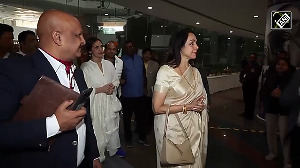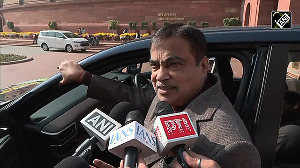The over one-lakh strong chartered accountant fraternity will exercise its franchise to elect a new Central Council in the Institute of Chartered Accountants of India.
The elections are slated for December 19 and 20. Normally, ICAI elections are a staid affair and evoke little interest outside the auditing community.
The Central Council, which is the apex decision-making body of the regulator, has 30 members. One-fifth of the Council strength is made up of government nominees.
The revenue department, the department of company affairs and the Comptroller and Auditor General's office have a representative each in the Council. The government also nominates three CAs as public representatives in the Council.
Of all issues that the prospective candidates are seeking to address in the forthcoming elections, the most crucial is how proprietary CA firms and other small firms can equip themselves to better exploit the opportunities and challenges thrown by a globalising economy.
If one takes a quick look at the CA industry structure, there were 42,339 firms as on April 1, 2001. However, 31,144 were sole proprietary firms. There were just 375 firms with five or more partners.
The scenario should have changed post liberalisation. But, unfortunately, it has not. This is what is bothering the domestic CA firms now.
And the urgency is more so given the business clout the multinational accounting firms possess. To be fair to them, the MAFs have brought to the table not only expertise and skill-sets, but also experiences from their global operations.
In the past two years, the domestic CA fraternity seems to have suddenly woken up to the harsh realities, where either they have to consolidate and stand up to the challenges of the new millennium or perish.
The bitter fact is that ICAI as a regulator of the auditing profession has not done enough to enable such consolidation.
As the S Gurumurthy-led CA action committee points out, Section 11 of the Companies Act, 1956 restricts the number of partners in a partnership firm to 20.
Further, the Chartered Accountants Act, 1949 restricts a CA firm to be either a sole proprietary or a partnership firm.
Further, there are restrictions under the Companies Act on the acceptance on the number of audits that a CA may accept.
The number of audits that a CA firm can undertake is also linked to the number of partner CAs it has.
Also, under the Companies Act, 1956 a firm cannot be a shareholder in a company and thereby cannot control a company.
This restrains CAs from floating and thereby controlling a company that can undertake activities that are not legally or technically possible to be carried out by a CA firm.
The institute is gradually waking up to all these realities. The Naresh Chandra committee on company-auditor relations looked at some of these issues. It has, in fact, suggested that the limit on the number of partners in a firm be scrapped.
During the past year, these issues were debated in various fora, including the Jayant Gokhale committee set up by ICAI's Central Council.
The Gokhale committee's recommendations on MAF-related issues were discussed by the Council and also endorsed by it.
One of the fallout was the decision to bar multinational consulting firms to have names that were similar to their audit firms in India.
The election issues, contestants claim, are unlikely to be dominated by the prevalent MAF versus domestic CA firms debate.
But the issue of facing the challenges today, is not entirely unrelated to the entire debate.
Further, the debate is highly polarised. While domestic CAs make up the numbers accounting for over 90 per cent of the fraternity, the MAF firms along with multinational consulting firms that have associates in big domestic firms, have much of the creamy clientele and deep pockets.
The MAFs have shown little interest in having a greater say in the Council decisions. Of the 24 Council seats, representatives from the MAFs are contesting just three.
Their representation in the present Council too is restricted to three seats.
But then, it's proportionate to the CAs employed by the MAFs and the Big Four consulting firms, points out a Central Council contestant.
The 24 elected seats in the Council are divided into five zones.
While the western region has the maximum eight seats, the southern region and northern region (which includes Delhi) follow with six and five seats, respectively. The Central (three) and the eastern (two) regions make up the balance five seats.
Other issues like term of the Council and the bonafide of the contestants are also being discussed now. At present, a CA can continue to get elected to the Council any number of times.
This issue bothers many since it blocks the infusion of fresh ideas into the Council discussions. Some of the past presidents have been in the Council for over nine to 10 years.
Also, the aspirant is not required to prove his bonafides or even attest to it. An aspirant, while canvassing, can come clean by informing all CA members that there are no disciplinary proceedings against him, or the firm he represents or his partners. This is the minimum a voter can demand.





